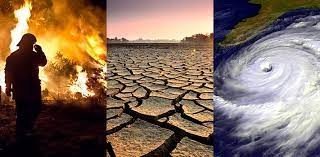One of the most critical concerns facing Earth today is global climate change. The planet’s weather systems are changing faster than ever because of human activity, which has far-reaching effects on ecosystems, international economies and weather patterns. This article examines what causes climate change, its impacts, and possible solutions.
Causes of Climate Change
The leading cause for concern here is that more greenhouse gases are in the atmosphere now than before. Sunlight gets trapped by gases like carbon dioxide (CO2), methane (CH4), and nitrous oxide (N2O), creating what we call an “envelope effect”, which heats everything on the earth’s surface. Artificial sources such as burning fossil fuels, deforestation or industrial processes emit this type of gas in large quantities.
Fossil Fuels’ Role
Carbon dioxide emissions come primarily from coal, oil, or natural gas power generation, accounting for about three-quarters of the total yearly emissions. CO2 levels have risen dramatically over the last century due to these activities alone.
Deforestation and Land Use
Deforestation also contributes significantly to climate change by releasing stored carbon into the atmosphere when trees are cut down or burnt. Additionally, changes in land use by agriculture and urbanization decrease the ability to absorb CO2, thus worsening matters further.
Impacts of Climate Change
Climate change affects everyone everywhere; it has no boundaries. The effects are so diverse that they can be observed worldwide.
Rising Sea Levels
Global warming leads to melting ice glaciers at higher altitudes or poles, increasing oceanic volumes and rising sea levels. This poses a great danger to those living along coastlines and inland, where flooding becomes rampant, especially during heavy rains. At the same time, erosion mainly affects low-allow-lying, eventually uninhabitable.
Extreme Weather Events
Another consequence of global warming is an increase in the frequency and severity of extreme weather events. These include hurricanes, typhoons, well as droughts and wildfires, which have become more common in recent times, causing widespread destruction to ecosystems, infrastructure, and people’s lives, among other things.
Addressing Climate Change
To reduce the effects of climate change, prompt and concerted efforts must be made worldwide. This involves cutting greenhouse gas emissions, switching over renewable energy sources like solar power, wind turbines, hydroelectric plants, etc. and adopting sustainable practices at every level possible.
Transitioning to Renewable Energy
One fundamental way we could tackle this problem is by shifting from non-renewable sources such as oil coal towards clean forms which are inexhaustible, for example, harnessing sunlight using photovoltaic panels or windmills that generate electricity when rotated by strong gusts blowing across open fields near coastsides populated densely with turbines.
Promoting Sustainable Practices
Individuals and businesses also contribute to mitigating climate change by adhering to environmentally friendly habits. These may include reducing energy consumption by recycling paper bottles, cans, plastics, etc, using energy-saving appliances, supporting companies with green policies, and always being on the lookout for ways to conserve natural resources, thereby leaving behind a minimal footprint.
Global Cooperation and Policy
In conclusion, dealing with global climate change will require a lot of effort from all stakeholders. Governments must come up with stricter laws regarding environmental conservation, while individuals need to take personal responsibility for managing waste materials properly so as not to pollute our surroundings any further than they already are












1 thought on “Widespread Climate Change: A Pressing Problem ”